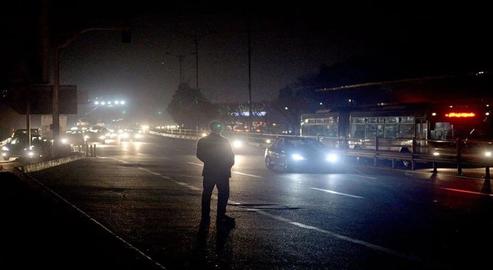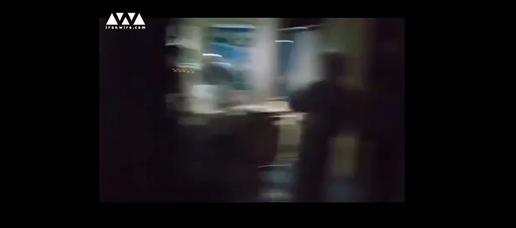A baker dumps his spoiled dough in front of Ilam Electricity Office. A man asks in terror about the fate of his hospitalized father in Tabriz. A woman tears off her state-sanctioned hijab at a municipal office and declares: “No-one is here. There’s just one angry woman here today."
These and countless other videos circulating online in the past few days are testament to the rage and frustration of ordinary Iranians forced to deal with weeks of relentless, hours-long power cuts. Businesses are shuttered, and the lights are out. Families have taken to their rooftops en masse to yell out: “Death to Khamenei”.
Those with access to the internet – or at least their family WhatsApp groups – have posted on social media about the nightmare of daily blackouts and ensuing water outages. Some have called on friends and neighbors to take part in street protests. Others resort to black humor to cope with a situation fast becoming intolerable.
The serious unrest started on Sunday, July 4, when Iran’s Meteorological Agency announced that temperatures would soon be rising above 40 degrees all over the country, even in the northernmost provinces. The country’s Power Generation, Distribution, and Transmission Company, known as Tavanir, then warned that more blackouts were on the way. No power meant no air conditioning.
The street protests began shortly afterward. Citizens in parts of Golestan province and Kazerun in Shiraz held rallies in front of the governors’ offices, blocked the roads and gathered in front of local electricity offices to express their outrage. Not long afterward, officials of the Islamic Republic started commenting on the crisis as well.
Speaker of Parliament Mohammed Bagher Ghalibaf used his personal Twitter account to demand that Tavanir stick to its self-designated schedule of power outages. President Hassan Rouhani apologized to the people on Tuesday, saying they deserved to be informed when the electricity would cut out. Ordinary citizens, meanwhile, have bigger questions.
The “Angry Woman” Makes Instant History
“There’s just one angry woman here today”, yelled the bystander who entered the municipal office in the sweltering heat. Pulling off her headscarf, she snapped: "You just put this damn scarf on your head. F*ck this scarf... Is this what we get for being Muslim?”
The incident has yet to be definitively located. Some believe it took place in Kermanshah, and still others in Gorgan, the capital of Golestan province. But it went viral nonetheless, with some Iranian social media users finding in the phrase “angry woman” an echo of previous utterances heard at mass demonstrations, and posting their agreement under the hashtag #angry_woman.
The hashtag proved popular with Iranians opposed the country’s mandatory veiling rule who said it was impossible to tolerate a hijab and mantle in temperatures above 40 degrees. The journalist Mahsa Amrabadi wrote: "An eternal curse on you! This mantle and the obligatory hijab, along with the constant power outages, and the unbearable heat, and the fear of coronavirus, and the mask, and economic pressures, have left no power for anyone!
“While the power is out, women from different parts of the country should come down to the streets without hijab and chant slogans against the unbearable heat."
Doctors Working in the Dark
The despair and anger are not limited to women forced to wear hijab. A white-uniformed baker in Ilam was caught on camera silently pouring his rotten dough onto the pavement in front of the local electricity building. In another video, the trembling voice of a man could be heard asking in Turkish about the fate of his father in Shams Hospital in Tabriz: "There is no electricity, my father cannot breathe, what should I do if he dies?"
Worse still was a video received by IranWire of a pitch-black critical care ward in Iran struggling in one of the outages. The doctor gave his name as Dr. Hashemian, and reported that several patients hooked up to machines had died when the power went out.
In another posted online, a doctor said that patients in ICU wards were enduring high fevers in the blistering heat and doctors were resorting to hand-pumped ventilators to treat COVID-19 patients for up to 15 minutes at a time, until the emergency power supply came on. Another medical worker in the city of Buhshehr reported having stitched up a patient’s head by the light of a mobile phone.
Students’ Anguish at Missed Exams
For the past 18 months Iranian students have struggled to get by on an inefficient system of virtual classrooms and poorly-distributed digital devices. They were poised to begin their final exams for the year when the blackouts began.
In one video sent to IranWire, a father in Tehran said his daughter’s examination had been postponed twice in a row and she was left shaking from the stress. Another student shared their frustration on Twitter, writing: “Because of the blackouts, and because tomorrow's exam is [scheduled for] when the electricity cuts out, I have to walk through the streets for two hours beforehand to a place where there is electricity and take my exam there. Life is beautiful."
Amid this fresh round of sustained and unfair disruption to their lives, Iranians have struggled to find a consensus on who is to blame. One Iranian-operated Twitter account, called Historical Memory, proffered an answer in the form of an old video of Ali Khamenei, the Supreme Leader of the Islamic Republic, giving a speech in September 2007.
“The Iraqi people have problems with electricity,” Khamenei said. “They have problems with safe water. These need answers. The Americans must answer. They cannot escape responsibility. If they ignore these problems, they will pay for it. They will get caught. Hitler and Saddam were also caught in the end."
The video prompted some to wonder if Khamenei, as the most senior decision-maker in the Islamic Republic, were not in fact culpable for the blackouts. Without the continuation of the nuclear program and expansionist policies in the region, Iran might have been in a position to adequately maintain its electricity infrastructure.
Tavanir, for its part, has blamed that the power outages on cryptocurrency mining – despite senior government officials having previously said bitcoin mining accounted for just a fraction of Iran’s electricity usage. Regardless, the Iranian parliament has called on the government to create the conditions for Iran to generate $500 million a year from extracting digital currencies in a bid to get around sanctions.
Reza Hajilou, a writer and social activist, summarized the contradiction thus: "Ahvaz. Air temperature: 50 degrees. Cause of power outage: Bitcoin mining. Cause of mining: sanctions money-making schemes. Reason for sanctions: nuclear energy. Stated reason for wanting nuclear energy: electricity."
Related coverage:
Industries at Risk as Bitcoin Mining Brings Blackouts to Iranian Cities
Blackouts in Iran: Why is the Electricity Deficit So High This Summer?
Dispatch from Tehran: Blackouts Leading to Bankruptcy
Water Tariffs to Increase in Iran Ahead of Summer Shortages
Fact File: Did Bitcoin Mining Lead to Blackouts in Iran?
Coronavirus in Iran: Power Outages, Black Fungus, and Warnings of a Fifth Surge
visit the accountability section
In this section of Iran Wire, you can contact the officials and launch your campaign for various problems



























comments